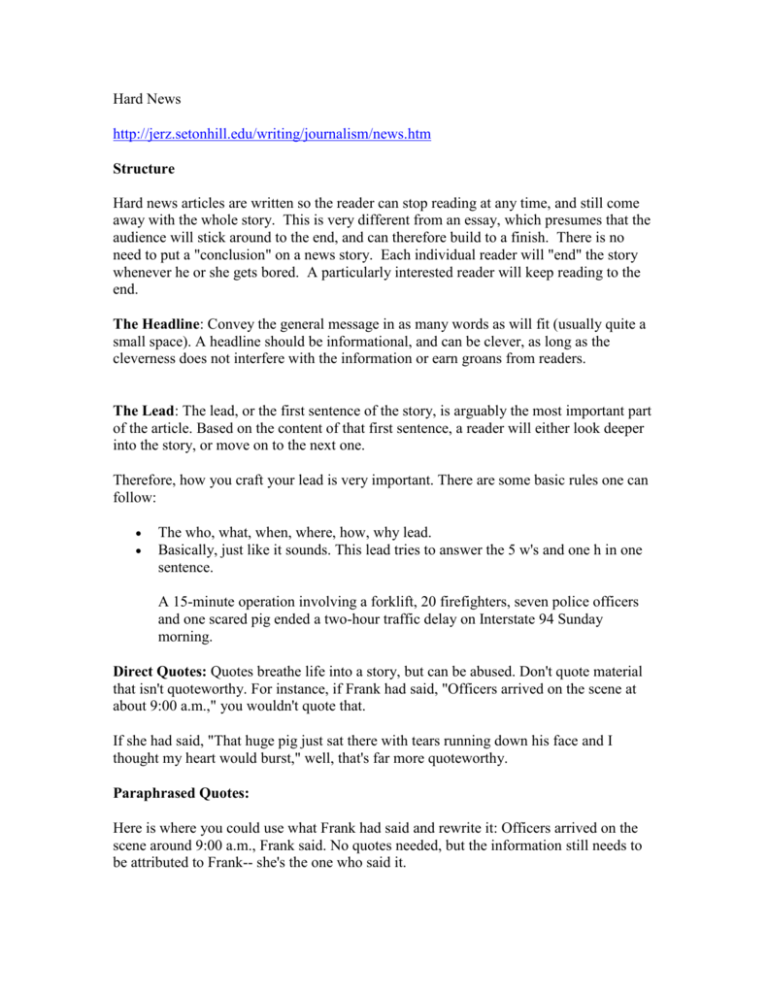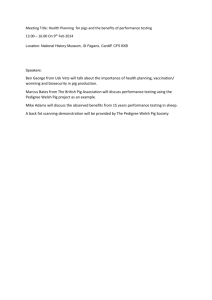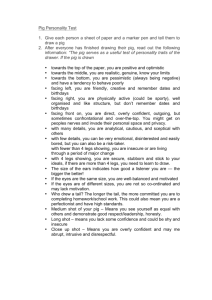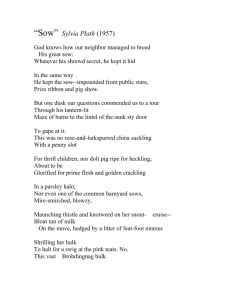hardnewstheoryandvocab
advertisement

Hard News http://jerz.setonhill.edu/writing/journalism/news.htm Structure Hard news articles are written so the reader can stop reading at any time, and still come away with the whole story. This is very different from an essay, which presumes that the audience will stick around to the end, and can therefore build to a finish. There is no need to put a "conclusion" on a news story. Each individual reader will "end" the story whenever he or she gets bored. A particularly interested reader will keep reading to the end. The Headline: Convey the general message in as many words as will fit (usually quite a small space). A headline should be informational, and can be clever, as long as the cleverness does not interfere with the information or earn groans from readers. The Lead: The lead, or the first sentence of the story, is arguably the most important part of the article. Based on the content of that first sentence, a reader will either look deeper into the story, or move on to the next one. Therefore, how you craft your lead is very important. There are some basic rules one can follow: The who, what, when, where, how, why lead. Basically, just like it sounds. This lead tries to answer the 5 w's and one h in one sentence. A 15-minute operation involving a forklift, 20 firefighters, seven police officers and one scared pig ended a two-hour traffic delay on Interstate 94 Sunday morning. Direct Quotes: Quotes breathe life into a story, but can be abused. Don't quote material that isn't quoteworthy. For instance, if Frank had said, "Officers arrived on the scene at about 9:00 a.m.," you wouldn't quote that. If she had said, "That huge pig just sat there with tears running down his face and I thought my heart would burst," well, that's far more quoteworthy. Paraphrased Quotes: Here is where you could use what Frank had said and rewrite it: Officers arrived on the scene around 9:00 a.m., Frank said. No quotes needed, but the information still needs to be attributed to Frank-- she's the one who said it. Journalism Example Wild pig causes two-hour traffic delay on I-94 By Joe Student (MyTown) January 24) A 15-minute operation involving a forklift, 20 firefighters, seven police officers and one scared pig ended a two-hour traffic delay on Interstate 94 Sunday morning. The wild pig, whom the fireman affectionately nicknamed "Tailgate," apparently wandered onto 1-94 around 8 a.m. and fell asleep in the middle of the two-lane freeway. St. Paul resident Geoffrey Saint was the first to come upon the 200-pound animal. "He practically took up the whole road," Saint said. "I barely slammed on my breaks in time." Saint said the cars behind him followed suit, each stopping short after reaching speeds of up to 70 mph. Saint stayed in his car and phoned area police, who responded at 8:20 a.m. Lieutenant Terry Frank was the first officer on the scene. "I couldn't believe my eyes," Frank said. "Here was this huge, sloppy pig, just napping in the middle of the road, oblivious to what was going on around him." Frank said she attempted to rouse the pig by poking him with a stick. "He just kept on snoring," she said. By 9 a.m., three fire trucks and four patrol cars had responded to the "sleeping pig" call. "We just sat there and wondered what in the world we could do," Frank said. Additional Information: Inverted Pyramid In a straight news story, it's best to get the most important information in your story up to the top-- your reader will often stop reading after the first few paragraphs, so its important that they have a good grasp of the story. Put the least important stuff at the end, and leave the unimportant stuff out altogether. Length of Paragraphs This is different than a term paper for English class. Keep your paragraphs short (one or two sentences) and make each of your points concise. Readers grow tired of big blocks of text, so it's best to break it up a bit. Objectivity vs. Opinion Your readers aren't interested your opinion here--so keep yourself out of the story. Attribute every claim or opinion you report to someone else, and don't editorialize. If you do, you take the entire element of objectivity-- and thus, truth- out of your story.




